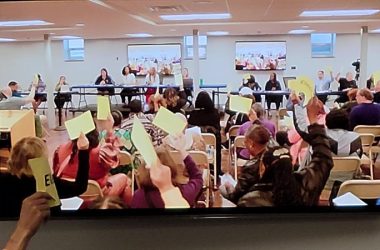With the legalization of recreational cannabis in Illinois quickly approaching, the Flossmoor Village Board began discussing what policies should be in place to reflect new laws.
With the legalization of recreational cannabis in Illinois quickly approaching, the Flossmoor Village Board began discussing what policies should be in place to reflect new laws.
As of Jan. 1, the sale, possession and use of recreational cannabis will be legal in Illinois, but the village will have options in terms of what types of recreational marijuana businesses, if any, it will allow and where.
The board has not voted on anything yet, but the consensus at the Nov. 4 meeting was that the village would likely consider one recreational cannabis dispensary with restrictions. An ordinance would be established outlining community standards and law enforcement regulations.
The Flossmoor Plan Commission will host a public hearing on the issue during its meeting at 7:30 p.m. Nov. 21 in Village Hall. The commission sends recommendations back to the board for final action and approval.
Public Works Director Scott Bugner said the village also needs to amend its code to reflect changes in medical marijuana laws; dispensaries will no longer have to abide by distance restrictions from places like schools and daycares.
Medical cannabis businesses are already allowed in Flossmoor, though the closest one currently is in Homewood.
Bugner said the village could opt out and not allow recreational cannabis businesses; it could allow them in some or all business districts, or it could require special-use permits in some or all business districts.
The business districts to consider include downtown, the “triangle” including Flossmoor Commons, and the former TIF district in southwest Flossmoor.
The village can also restrict things like business hours, type of business (dispensary, cultivation center, grower, infuser, transporter, etc.) and whether or not onsite consumption is allowed.
Mayor Paul Braun said requiring special-use permits seems like the best option to allow the village to maintain the most control and oversight possible.
“This is an opportunity that, if we see this as a potential for the community, we can tightly regulate it now before we’re faced with someone coming before the board asking for this with no regulations in place,” he said.
Village Attorney Kathleen Field-Orr said the village would not be able to issue licenses for businesses like it does for liquor sales; however, the village could require registration.
“Even though we’re not licensing them, we would have who’s managing it, where the contact person is, etc.,” she said. “Registration is permitted, and you can, by state law, limit the number (of establishments).”
Additionally, local governments will be able to implement up to a 3 percent sales tax on recreational marijuana, so one store could generate an estimated $300,000 or more annually for the village.
“Not that that’s the No. 1 driving force, but (the revenue) certainly makes it a consideration,” Braun said.
Trustee Jim Mitros said that if Flossmoor allows recreational marijuana businesses, video gaming/ gambling business operators might also ask for reconsideration to be allowed in the village.
“I drive around all around Chicagoland and I see these gambling places in strip malls that we don’t allow, but yet they’re in these other malls and they look good, and I haven’t heard of any problems with them,” Mitros said. “I just think that we have to start searching for revenue. We’ve got a lot of expensive things that we need to do.”
Trustee Perry Hoag said he is not opposed to having one dispensary in town, but he is also considering potential unintended consequences.
“We don’t know what this might look like in 10 years,” Hoag said. “The same reason we said no to Dotty’s and mini casinos, I think they don’t quite fit into the character of the community.”
Police Chief Tod Kamleiter said he expects most of the police enforcement will involve illegal street sales because of the increased popularity of cannabis.
Kamleiter said that in Colorado, where recreational cannabis was legalized in 2014, much of the enforcement deals with illegal growing operations. Colorado law allows residents to grow up to five plants for personal use in their homes, whereas Illinois law restricts home growing to medicinal-card holders, he said.
“I don’t see us having a lot of (issues) in terms of illegal grow houses in Flossmoor,” Kamleiter said. “I think our main concern is going to be illegal sale of marijuana on the street. It’s going to be much cheaper than it is in the dispensary — not probably as potent, but nonetheless cheaper.”
With the possibility of increased illegal street sales, other crimes such as possession of cannabis by a minor, use in public places or excessive cannabis possession could also rise.
An ordinance supporting local adjudication would give the village and police a course of action to deal with offenders, Kamleiter said.
He said he does not anticipate a rise in violent crimes or property damage relating to the new marijuana laws.
“I’ve read some of the studies and I’ve visited personally, not the inside of a dispensary in Colorado, but certainly some of the areas outside,” he said. “They’re very well kept and very nice. There’s no indication that there’s an uptick in homelessness or anything else around dispensaries.”
Cannabis use around anyone under the age of 21 will still be illegal, as will the possession of more than 30 grams by an Illinois resident, or more than 15 grams by a non-resident.

